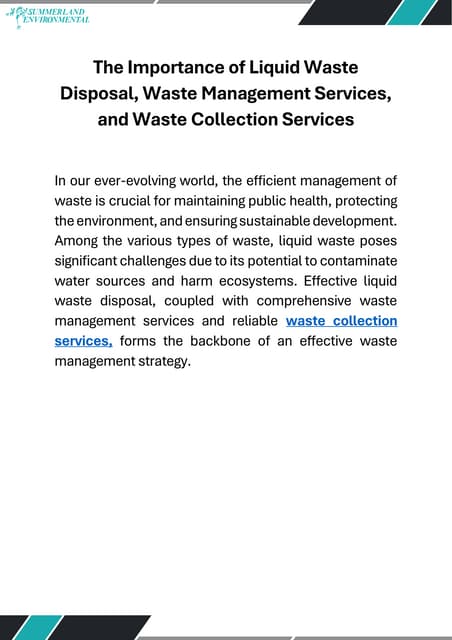The smart Trick of Reclaim Waste That Nobody is Discussing
The smart Trick of Reclaim Waste That Nobody is Discussing
Blog Article
Reclaim Waste Fundamentals Explained
Table of ContentsReclaim Waste Can Be Fun For Anyone10 Simple Techniques For Reclaim WasteReclaim Waste for DummiesReclaim Waste Can Be Fun For AnyoneNot known Details About Reclaim Waste
Check out the types, incidents, and forms of liquid waste. Domestic sewage waste describes the waste and items from a domestic septic container. This kind of waste is created by humans in homes, colleges, and other structures. This only includes septic systems that have a drainpipe field. The appropriate administration and disposal of residential sewer waste require liquid waste to be transferred to a sewage treatment plant where the correct methods and tools are used to cleanse and get rid of waste.
Industrial waste usually consists of potential threats, such as combustible products or a combination of liquid and strong waste items, and needs an advanced and thorough disposal procedure. The disposal of industrial waste typically entails the filtration of waste before transport to make sure risk-free and correct disposal. Industrial waste is created from results and drainage of commercial procedures and production.
This type of waste can not utilize the same sewage administration transport or procedures as septic or business liquids. The hazardous waste management procedure calls for the inspection and testing of liquid waste prior to it undergoes the disposal process (liquid waste removal). Drainage waste is the liquid waste that comes from drainage and excess stormwater in extremely inhabited locations or cities
Overflow waste can cause contamination and flooding if not handled correctly. Guaranteeing correct waste administration can stop disasters and decrease environmental damage.
Reclaim Waste for Dummies
Call PROS Solutions today to learn concerning our waste administration and disposal services and the proper methods to look after the liquid waste you generate.
(https://reclaim-waste-f27e88.webflow.io/)Do you understand what occurs to your water when you disengage, purge the commode or drain pipes the cleaning machine? No? Well, it deserves understanding. This supposed 'wastewater' is not only a crucial resource but, after treatment, will certainly be released to our land, waterways or the sea. Utilized water from toilets, showers, baths, kitchen area sinks, washings and industrial procedures is recognized as wastewater.

water made use of to cool down equipment or tidy plant and tools). Stormwater, a type of wastewater, is overflow that moves from farming and metropolitan areas such as roofs, parks, yards, roadways, paths and gutters right into stormwater drains, after rainfall. Stormwater streams neglected straight to local creeks or rivers, eventually getting to the sea.
The Basic Principles Of Reclaim Waste
In Queensland, many wastewater is treated at sewer therapy plants. Wastewater is transferred from domestic or commercial sites with a system of sewers and pump terminals, referred to as sewage reticulation, to a sewage treatment plant. City governments construct, maintain and run most sewage therapy plants. Operators are accredited under the Environmental Security Act 1994 to release cured wastewater at an acceptable environmental requirement into waterways.
The Division of Natural Resources suggests city governments regarding handling, operating and maintaining sewage systems and treatment plants. In unsewered areas, city governments might require householders to set up specific or household sewer treatment systems to deal with domestic wastewater from toilets, kitchens, restrooms and washings. The Department of Natural Resources authorises the use of house systems when they are proven to be efficient.
A lot of stormwater obtains no therapy. In some new communities, treatment of some stormwater to eliminate clutter, sand and crushed rock has begun utilizing gross pollutant here are the findings traps. Wastewater therapy happens in four phases: Gets rid of strong issue. Larger solids, such as plastics and various other items wrongly released to sewers, are removed when wastewater is gone through screens.
Uses little living microorganisms knows as micro-organisms to damage down and remove staying dissolved wastes and great particles. Micro-organisms and wastes are integrated in the sludge.
The Basic Principles Of Reclaim Waste
Nutrient elimination is not offered whatsoever sewage therapy plants because it calls for costly specialized tools. It is coming to be more usual in Queensland. Clear liquid effluent created after treatment may still contain disease-causing micro-organisms. If this effluent is released into waterways such as rivers or the sea, the micro-organisms will at some point pass away out.

This normally suggests wastewater needs to be treated or pollutants gotten rid of before it can be discharged to waterways. A lot of wastewater streams into the sewage system. Under the Act, neighborhood federal governments administer approvals and licences for eco relevant tasks (ERAs) entailing wastewater releases that may have a neighborhood influence. The division administers approvals and permits to Ages including wastewater releases that might have a regional or statewide impact.
Little Known Questions About Reclaim Waste.
Or else, examples are considered lab evaluation. Typically lots of examinations are needed to establish the degrees of each of the different toxins such as oils, heavy metals and chemicals in water. Tracking gives accurate information about water top quality and can validate that licence conditions are being satisfied. The information obtained with tracking supplies the basis for making water high quality choices.
Report this page